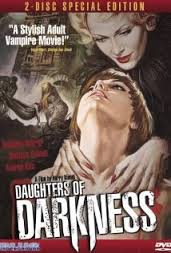
DAUGHTERS OF DARKNESS
Belgium, 1971, 96 minutes. Colour.
Delphine Seyrig, Daniele Ouimet, John Karlen, Andrea Rau, Paul Esser.
Directed by Harry Kumel.
One wonders why vampire stories and films have been so popular in recent years. Continually resurrecting evil, which is continually combated and defeated, serves as an imaginative myth to express something of the mystery of evil - so much destruction, preternatural powers and human heroics. However, many films revel in gore, or go for the ludicrous. This Belgium film is less gory, though it has its moments; it has too much of a perverse lesbian atmosphere. But it has many features of great interest to vampire fans - Delphine Seyrig is the vampire, there are visual echoes and parodies of Last Year at Marienbad and an atmosphere of menace that is well communicated. An unusual horror film.
1. The appeal of horror films, interest in vampire films: fear, fantasies, morbidity?
2. The overall appeal of the vampire myths: themes of immortality, control over other people, sadism. power and death? Sexuality and violence?
3. The female version of vampires with the overtones of violence and sexuality? The kind of woman who is portrayed as a vampire? Insight into this kind of woman?
4. The quality of this film as a Belgium film, its use of Belgian atmosphere?
5. The main star, Delphine Seyrig and the echoes of her performance in 'Last Year at Marienbad'? This being parodied in the presentation of the hotel? The comparison of her vampire with other film vampires? The impact that she made, sinister, violent, sensual, mysterious?
6. How authentic was the atmosphere how credible? The emphasis on blood rather than on fangs and violence? The effect on the audience in terms of fear, identification?
7. The ordinariness of the couple at the beginning, their relationship, marriage and honeymoon? The character of each? Their constant reference to 'mother' and her influence? The fact that they were seduced and became victims? Sympathy?
8. The portrayal of the hotel, the town, the police. the violent atmosphere of murder and mystery?
9. The entrance of the Countess and her appearance, the mystery of the forty years, her stories and fascination of Stefan? The mysterious secretary? The transition to violence and seduction, cruelty and death? The impact of vampires and its mythology, the pros and cons? The irony of Veronica's death and her being transferred?
10. The emphasis on Stefan and his fascination with the Countess' stories, the relationship with the secretary, the self-assertion of masculinity, the death of the secretary? His death?
11. The role of Leona, her seduction of Stefan, the accident of her violent death?
12. The transition to Valerie and her seduction. as a companion to the Countess. as her successor? Especially with the violent death of the Countess?
13. How seriously should films like this be taken? As an example of the genre? As a camp illustration of the genre? Decadence or seriousness? The value of this kind of film?